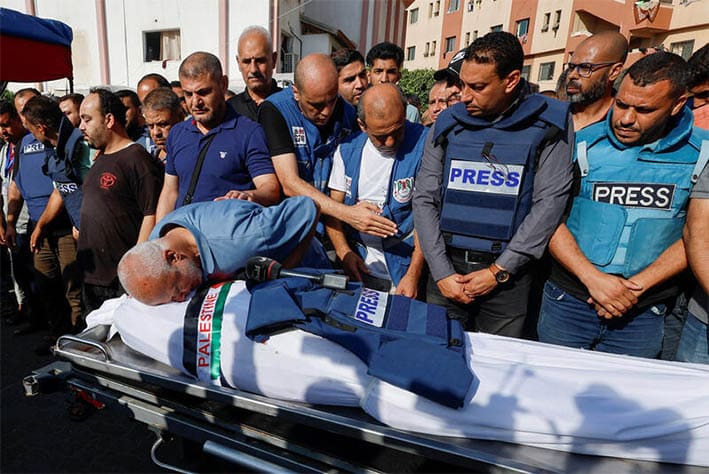Journalists are to hold a minute’s silence at noon on Monday in memory of colleagues who lost their lives covering events in Palestine, head of the Cypriot journalists’ union George Frangos said.
“Never have so many journalists died in such a short time span, and it is utterly clear many of the deaths are targeted,” Frangos told state broadcaster CyBC.
Over 100 journalists covering the hostilities in Palestine have died in the space of three months. Of these 96 are Palestinians, four Israeli and two Lebanese.
The minute of silence, Frangos said, is to express solidarity with local and foreign-born journalists (most of whom are of Palestinian origin), working for all media outlets in Gaza.
These colleagues are severely hampered in their task to keep the world informed about what is going on in the region, and Israel has taken a tight control on the flow of information, preventing open coverage, Frangos said.
Meanwhile, according to Al Jazeera, more than 50 media premises or offices in Gaza have been completely or partially destroyed by Israeli attacks. Hundreds of Palestinian journalists as well as their families have been forcibly displaced to the south.
The media workers are forced to abandon their reporting equipment in offices in the north to live and report under difficult conditions amid frequent communication blackouts.
In December last year Reporters Without Borders (RSF) filed its second complaint with the International Criminal Court (ICC) for alleged war crimes committed by the Israeli army against Palestinian journalists in Gaza.
“RSF has reasonable grounds to believe that the journalists named in this complaint were the victims of attacks amounting to war crimes,” a statement issued by the group said.
“The Al Jazeera news team had been particularly targeted and almost dissolved,” Frangos said, noting that the team’s chief reporter, Wael al-Dahdouh, has lost every single member of his immediate family and a grandchild, as well as being wounded himself.
“The acts of solidarity will continue,” Frangos said, noting that although it employed aggressive tactics against journalists preventing coverage of the situation in Gaza, Israel had clearly lost the battle of public opinion.







Click here to change your cookie preferences